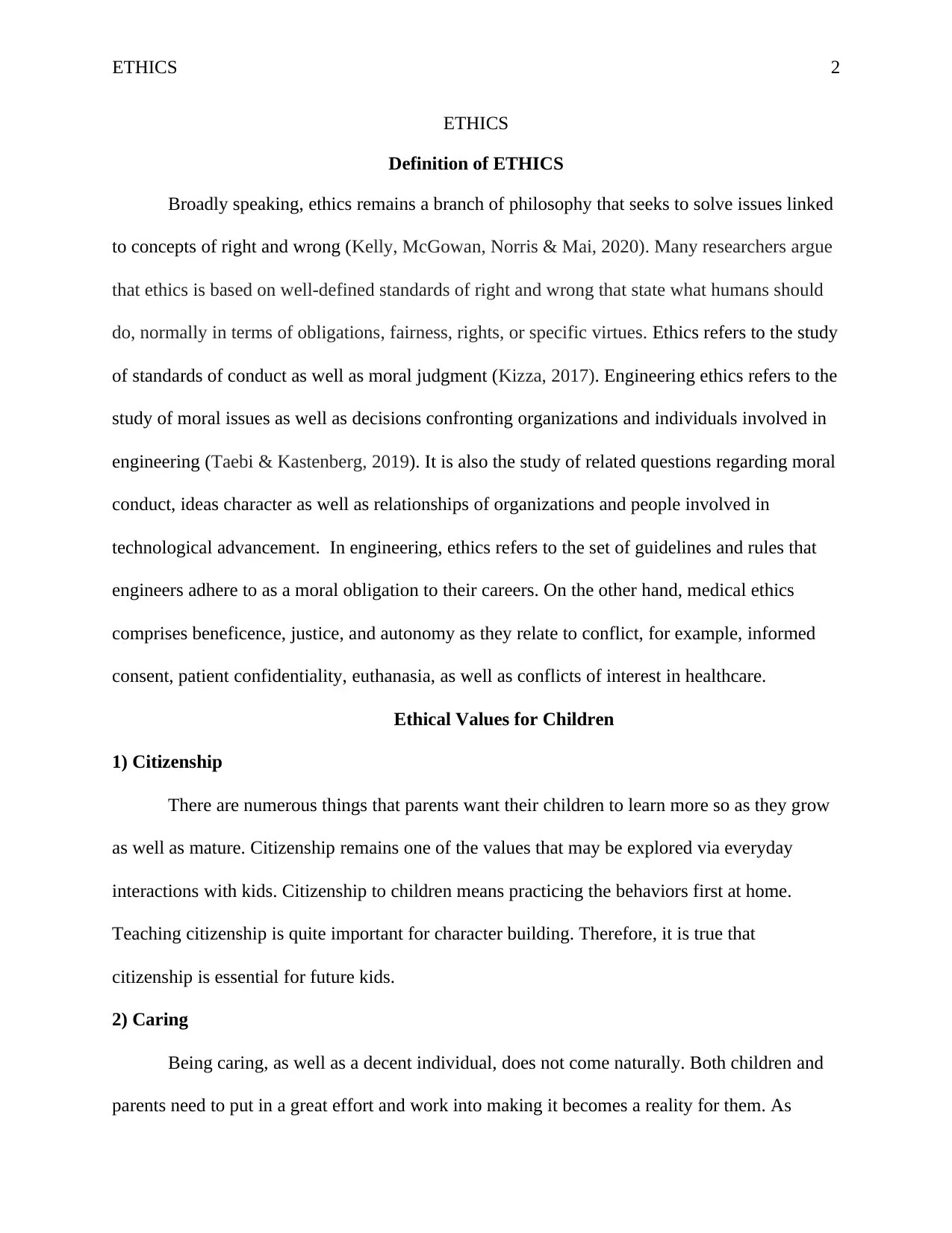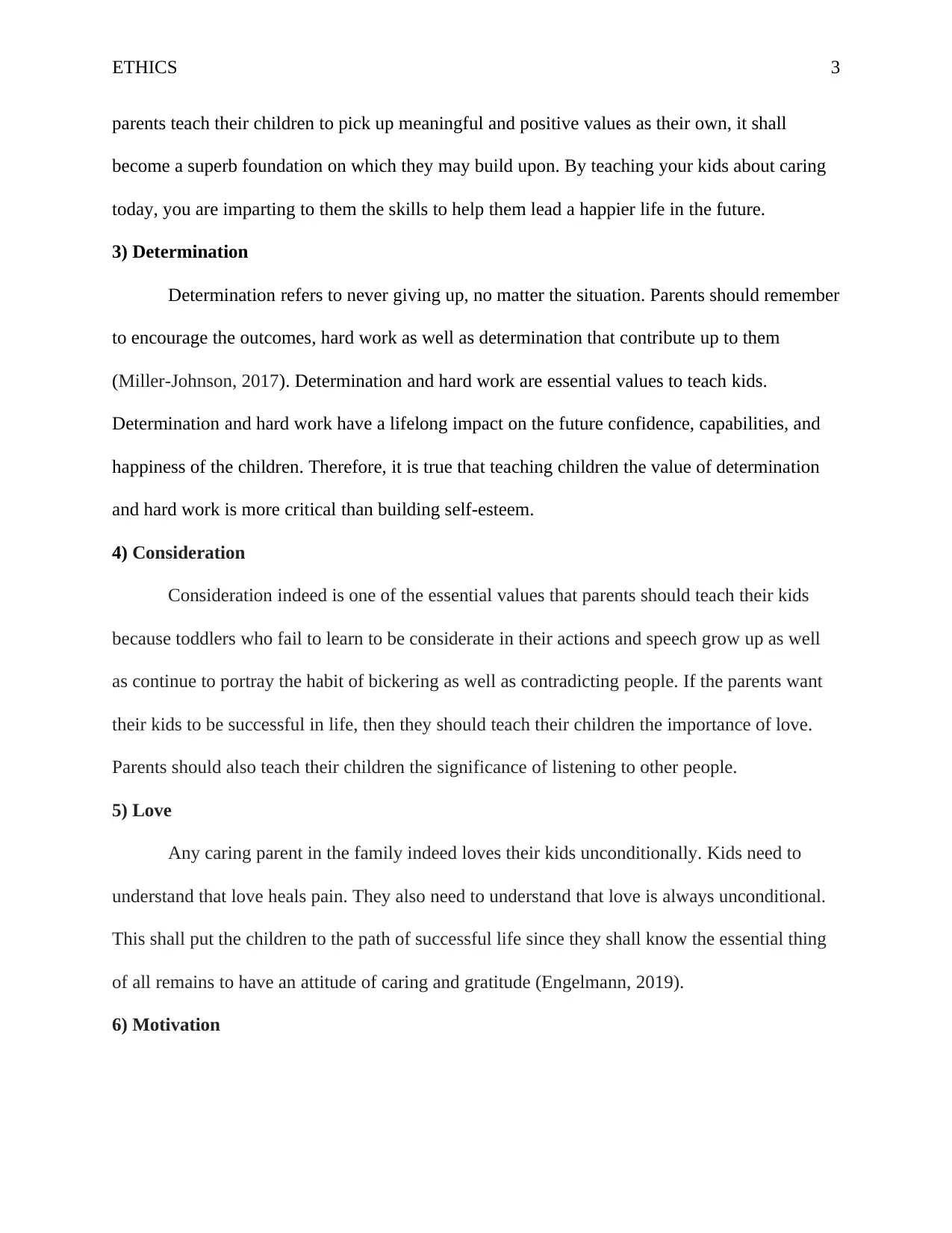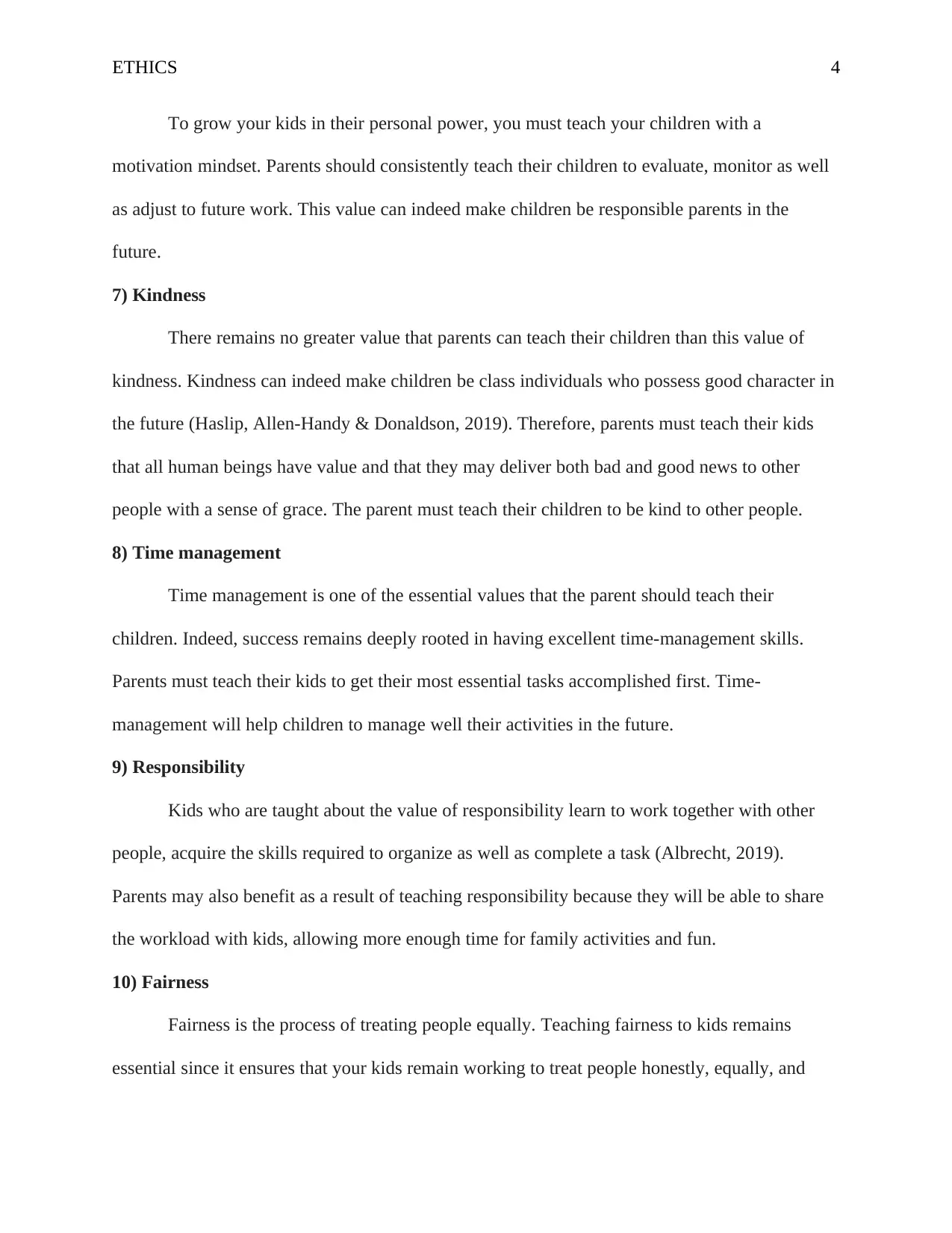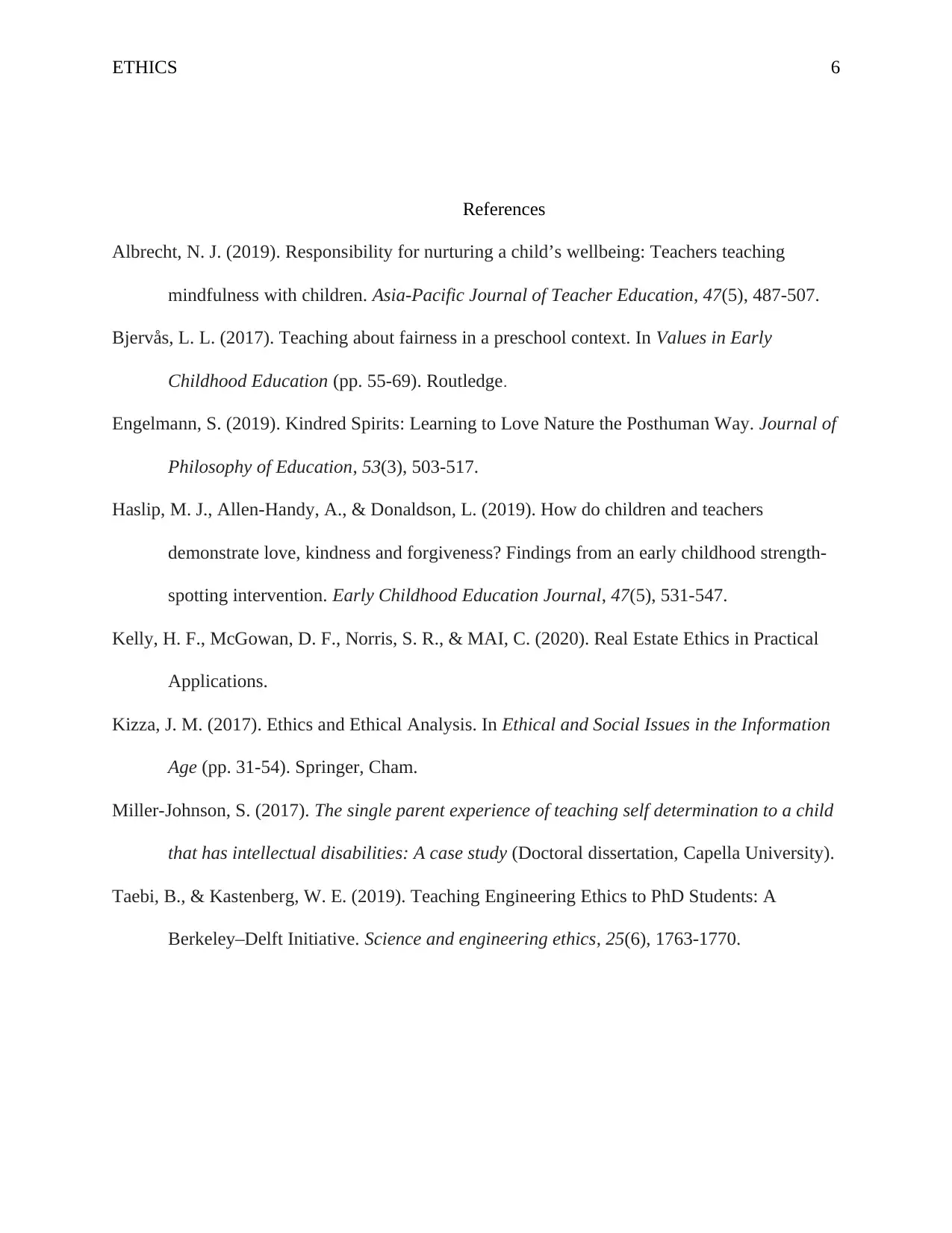ENGR 302: Spring 2019-20 Ethics Report on Future Kids' Values
VerifiedAdded on 2022/09/13
|6
|1286
|19
Report
AI Summary
This report delves into the realm of ethics, defining it as a branch of philosophy addressing right and wrong, particularly within the context of engineering. It emphasizes the importance of ethical guidelines for engineers. The report then identifies and elaborates on ten crucial ethical values deemed essential for children's development, including citizenship, caring, determination, consideration, love, motivation, kindness, time management, responsibility, and fairness. Each value is explained with its significance for the future and its role in shaping a child's character, well-being, and success. The report highlights the importance of instilling these values from an early age to build a strong moral foundation and prepare children for a successful and fulfilling life. References to supporting literature are included.

Running head: ETHICS 1
Ethics
Name
Institution
Ethics
Name
Institution
Paraphrase This Document
Need a fresh take? Get an instant paraphrase of this document with our AI Paraphraser

ETHICS 2
ETHICS
Definition of ETHICS
Broadly speaking, ethics remains a branch of philosophy that seeks to solve issues linked
to concepts of right and wrong (Kelly, McGowan, Norris & Mai, 2020). Many researchers argue
that ethics is based on well-defined standards of right and wrong that state what humans should
do, normally in terms of obligations, fairness, rights, or specific virtues. Ethics refers to the study
of standards of conduct as well as moral judgment (Kizza, 2017). Engineering ethics refers to the
study of moral issues as well as decisions confronting organizations and individuals involved in
engineering (Taebi & Kastenberg, 2019). It is also the study of related questions regarding moral
conduct, ideas character as well as relationships of organizations and people involved in
technological advancement. In engineering, ethics refers to the set of guidelines and rules that
engineers adhere to as a moral obligation to their careers. On the other hand, medical ethics
comprises beneficence, justice, and autonomy as they relate to conflict, for example, informed
consent, patient confidentiality, euthanasia, as well as conflicts of interest in healthcare.
Ethical Values for Children
1) Citizenship
There are numerous things that parents want their children to learn more so as they grow
as well as mature. Citizenship remains one of the values that may be explored via everyday
interactions with kids. Citizenship to children means practicing the behaviors first at home.
Teaching citizenship is quite important for character building. Therefore, it is true that
citizenship is essential for future kids.
2) Caring
Being caring, as well as a decent individual, does not come naturally. Both children and
parents need to put in a great effort and work into making it becomes a reality for them. As
ETHICS
Definition of ETHICS
Broadly speaking, ethics remains a branch of philosophy that seeks to solve issues linked
to concepts of right and wrong (Kelly, McGowan, Norris & Mai, 2020). Many researchers argue
that ethics is based on well-defined standards of right and wrong that state what humans should
do, normally in terms of obligations, fairness, rights, or specific virtues. Ethics refers to the study
of standards of conduct as well as moral judgment (Kizza, 2017). Engineering ethics refers to the
study of moral issues as well as decisions confronting organizations and individuals involved in
engineering (Taebi & Kastenberg, 2019). It is also the study of related questions regarding moral
conduct, ideas character as well as relationships of organizations and people involved in
technological advancement. In engineering, ethics refers to the set of guidelines and rules that
engineers adhere to as a moral obligation to their careers. On the other hand, medical ethics
comprises beneficence, justice, and autonomy as they relate to conflict, for example, informed
consent, patient confidentiality, euthanasia, as well as conflicts of interest in healthcare.
Ethical Values for Children
1) Citizenship
There are numerous things that parents want their children to learn more so as they grow
as well as mature. Citizenship remains one of the values that may be explored via everyday
interactions with kids. Citizenship to children means practicing the behaviors first at home.
Teaching citizenship is quite important for character building. Therefore, it is true that
citizenship is essential for future kids.
2) Caring
Being caring, as well as a decent individual, does not come naturally. Both children and
parents need to put in a great effort and work into making it becomes a reality for them. As

ETHICS 3
parents teach their children to pick up meaningful and positive values as their own, it shall
become a superb foundation on which they may build upon. By teaching your kids about caring
today, you are imparting to them the skills to help them lead a happier life in the future.
3) Determination
Determination refers to never giving up, no matter the situation. Parents should remember
to encourage the outcomes, hard work as well as determination that contribute up to them
(Miller-Johnson, 2017). Determination and hard work are essential values to teach kids.
Determination and hard work have a lifelong impact on the future confidence, capabilities, and
happiness of the children. Therefore, it is true that teaching children the value of determination
and hard work is more critical than building self-esteem.
4) Consideration
Consideration indeed is one of the essential values that parents should teach their kids
because toddlers who fail to learn to be considerate in their actions and speech grow up as well
as continue to portray the habit of bickering as well as contradicting people. If the parents want
their kids to be successful in life, then they should teach their children the importance of love.
Parents should also teach their children the significance of listening to other people.
5) Love
Any caring parent in the family indeed loves their kids unconditionally. Kids need to
understand that love heals pain. They also need to understand that love is always unconditional.
This shall put the children to the path of successful life since they shall know the essential thing
of all remains to have an attitude of caring and gratitude (Engelmann, 2019).
6) Motivation
parents teach their children to pick up meaningful and positive values as their own, it shall
become a superb foundation on which they may build upon. By teaching your kids about caring
today, you are imparting to them the skills to help them lead a happier life in the future.
3) Determination
Determination refers to never giving up, no matter the situation. Parents should remember
to encourage the outcomes, hard work as well as determination that contribute up to them
(Miller-Johnson, 2017). Determination and hard work are essential values to teach kids.
Determination and hard work have a lifelong impact on the future confidence, capabilities, and
happiness of the children. Therefore, it is true that teaching children the value of determination
and hard work is more critical than building self-esteem.
4) Consideration
Consideration indeed is one of the essential values that parents should teach their kids
because toddlers who fail to learn to be considerate in their actions and speech grow up as well
as continue to portray the habit of bickering as well as contradicting people. If the parents want
their kids to be successful in life, then they should teach their children the importance of love.
Parents should also teach their children the significance of listening to other people.
5) Love
Any caring parent in the family indeed loves their kids unconditionally. Kids need to
understand that love heals pain. They also need to understand that love is always unconditional.
This shall put the children to the path of successful life since they shall know the essential thing
of all remains to have an attitude of caring and gratitude (Engelmann, 2019).
6) Motivation
⊘ This is a preview!⊘
Do you want full access?
Subscribe today to unlock all pages.

Trusted by 1+ million students worldwide

ETHICS 4
To grow your kids in their personal power, you must teach your children with a
motivation mindset. Parents should consistently teach their children to evaluate, monitor as well
as adjust to future work. This value can indeed make children be responsible parents in the
future.
7) Kindness
There remains no greater value that parents can teach their children than this value of
kindness. Kindness can indeed make children be class individuals who possess good character in
the future (Haslip, Allen-Handy & Donaldson, 2019). Therefore, parents must teach their kids
that all human beings have value and that they may deliver both bad and good news to other
people with a sense of grace. The parent must teach their children to be kind to other people.
8) Time management
Time management is one of the essential values that the parent should teach their
children. Indeed, success remains deeply rooted in having excellent time-management skills.
Parents must teach their kids to get their most essential tasks accomplished first. Time-
management will help children to manage well their activities in the future.
9) Responsibility
Kids who are taught about the value of responsibility learn to work together with other
people, acquire the skills required to organize as well as complete a task (Albrecht, 2019).
Parents may also benefit as a result of teaching responsibility because they will be able to share
the workload with kids, allowing more enough time for family activities and fun.
10) Fairness
Fairness is the process of treating people equally. Teaching fairness to kids remains
essential since it ensures that your kids remain working to treat people honestly, equally, and
To grow your kids in their personal power, you must teach your children with a
motivation mindset. Parents should consistently teach their children to evaluate, monitor as well
as adjust to future work. This value can indeed make children be responsible parents in the
future.
7) Kindness
There remains no greater value that parents can teach their children than this value of
kindness. Kindness can indeed make children be class individuals who possess good character in
the future (Haslip, Allen-Handy & Donaldson, 2019). Therefore, parents must teach their kids
that all human beings have value and that they may deliver both bad and good news to other
people with a sense of grace. The parent must teach their children to be kind to other people.
8) Time management
Time management is one of the essential values that the parent should teach their
children. Indeed, success remains deeply rooted in having excellent time-management skills.
Parents must teach their kids to get their most essential tasks accomplished first. Time-
management will help children to manage well their activities in the future.
9) Responsibility
Kids who are taught about the value of responsibility learn to work together with other
people, acquire the skills required to organize as well as complete a task (Albrecht, 2019).
Parents may also benefit as a result of teaching responsibility because they will be able to share
the workload with kids, allowing more enough time for family activities and fun.
10) Fairness
Fairness is the process of treating people equally. Teaching fairness to kids remains
essential since it ensures that your kids remain working to treat people honestly, equally, and
Paraphrase This Document
Need a fresh take? Get an instant paraphrase of this document with our AI Paraphraser

ETHICS 5
respectfully (Bjervås, 2017). Parents should try to teach their children the importance of fairness
to enable them to treat people equally.
In conclusion, moral values should be instilled in children right from the beginning. This
is because they play a significant role in building the personality of the kid.
respectfully (Bjervås, 2017). Parents should try to teach their children the importance of fairness
to enable them to treat people equally.
In conclusion, moral values should be instilled in children right from the beginning. This
is because they play a significant role in building the personality of the kid.

ETHICS 6
References
Albrecht, N. J. (2019). Responsibility for nurturing a child’s wellbeing: Teachers teaching
mindfulness with children. Asia-Pacific Journal of Teacher Education, 47(5), 487-507.
Bjervås, L. L. (2017). Teaching about fairness in a preschool context. In Values in Early
Childhood Education (pp. 55-69). Routledge.
Engelmann, S. (2019). Kindred Spirits: Learning to Love Nature the Posthuman Way. Journal of
Philosophy of Education, 53(3), 503-517.
Haslip, M. J., Allen-Handy, A., & Donaldson, L. (2019). How do children and teachers
demonstrate love, kindness and forgiveness? Findings from an early childhood strength-
spotting intervention. Early Childhood Education Journal, 47(5), 531-547.
Kelly, H. F., McGowan, D. F., Norris, S. R., & MAI, C. (2020). Real Estate Ethics in Practical
Applications.
Kizza, J. M. (2017). Ethics and Ethical Analysis. In Ethical and Social Issues in the Information
Age (pp. 31-54). Springer, Cham.
Miller-Johnson, S. (2017). The single parent experience of teaching self determination to a child
that has intellectual disabilities: A case study (Doctoral dissertation, Capella University).
Taebi, B., & Kastenberg, W. E. (2019). Teaching Engineering Ethics to PhD Students: A
Berkeley–Delft Initiative. Science and engineering ethics, 25(6), 1763-1770.
References
Albrecht, N. J. (2019). Responsibility for nurturing a child’s wellbeing: Teachers teaching
mindfulness with children. Asia-Pacific Journal of Teacher Education, 47(5), 487-507.
Bjervås, L. L. (2017). Teaching about fairness in a preschool context. In Values in Early
Childhood Education (pp. 55-69). Routledge.
Engelmann, S. (2019). Kindred Spirits: Learning to Love Nature the Posthuman Way. Journal of
Philosophy of Education, 53(3), 503-517.
Haslip, M. J., Allen-Handy, A., & Donaldson, L. (2019). How do children and teachers
demonstrate love, kindness and forgiveness? Findings from an early childhood strength-
spotting intervention. Early Childhood Education Journal, 47(5), 531-547.
Kelly, H. F., McGowan, D. F., Norris, S. R., & MAI, C. (2020). Real Estate Ethics in Practical
Applications.
Kizza, J. M. (2017). Ethics and Ethical Analysis. In Ethical and Social Issues in the Information
Age (pp. 31-54). Springer, Cham.
Miller-Johnson, S. (2017). The single parent experience of teaching self determination to a child
that has intellectual disabilities: A case study (Doctoral dissertation, Capella University).
Taebi, B., & Kastenberg, W. E. (2019). Teaching Engineering Ethics to PhD Students: A
Berkeley–Delft Initiative. Science and engineering ethics, 25(6), 1763-1770.
⊘ This is a preview!⊘
Do you want full access?
Subscribe today to unlock all pages.

Trusted by 1+ million students worldwide
1 out of 6
Related Documents
Your All-in-One AI-Powered Toolkit for Academic Success.
+13062052269
info@desklib.com
Available 24*7 on WhatsApp / Email
![[object Object]](/_next/static/media/star-bottom.7253800d.svg)
Unlock your academic potential
Copyright © 2020–2026 A2Z Services. All Rights Reserved. Developed and managed by ZUCOL.





